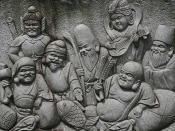From the Euthyphro dilemma, Plato argues that divine commands can never be genuinely moral. The divine commands are those belonging or coming from God. This argument stems from the idea that because God is omnipotent, omniscient that he will punish us when he detects any failures. Thus suggesting that the fear that motivates us to follow such divine commands is not a suitable motive to a certain moral action. Another argument that Plato presents is that God sets such divine commands because they are moral which raises the idea that morality exists as an entity separate to God. Both these ideas suggest that the divine command is not genuinely moral as they are acted upon in the interest of the individual and questions the motives of moral actions.
In Plato's argument, he addressees the motives of our moral actions. Since God is omnipotent, omniscient, and omni benevolent he presupposes that the relationship between humans and God is based fear.
He suggests that fear is what motivated humans to follow in God's divine command thus showing that such commands are not moralistic but on the other hand is a crude kind of politics where status and power dominate the more insignificant.
Through this argument, it is evident that God is seen as a cold and distant figure. Yet within the Bible, it often talks about God being holy. It may be said that God is the source of all holiness and embodies all that is holy. Holiness is intrinsic to God's nature. Holy is derived from Hebrew to mean separate showing his purity and cleanliness from that of imperfect humans. From Psalms 99:3, it reads, "Let them laud your name. Great and fear-inspiring, holy it is." From this, we can see that this fear is not...


